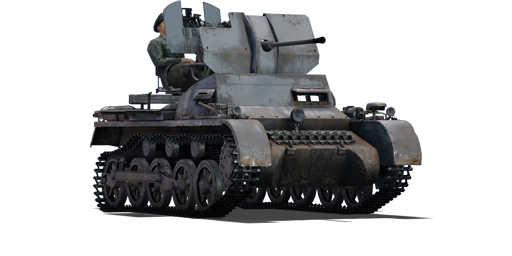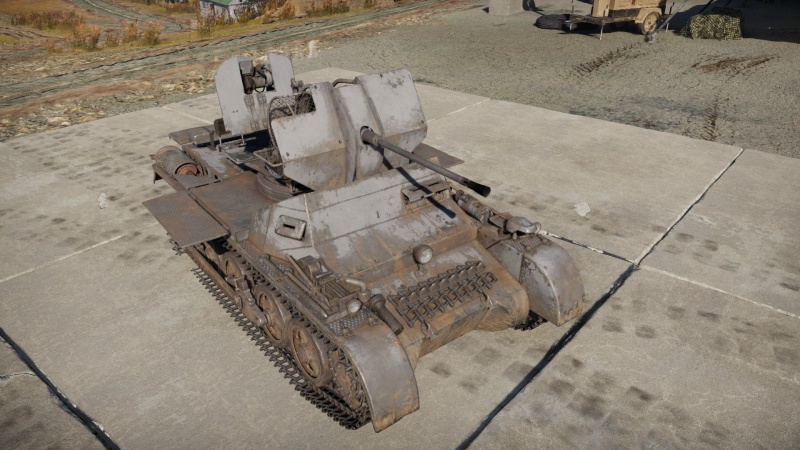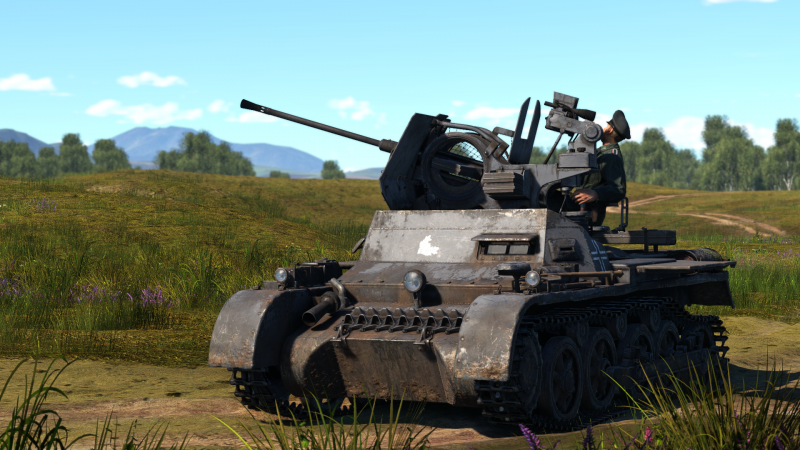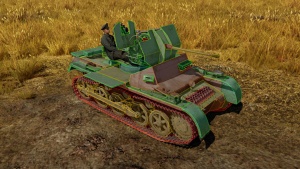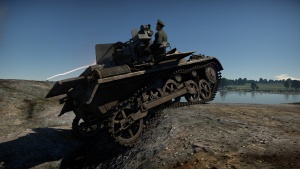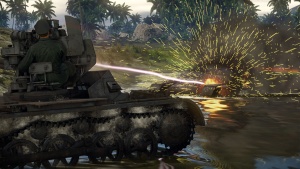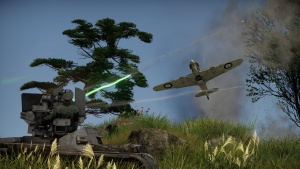Difference between revisions of "Flakpanzer I"
(New Description Project - Germany Priority: 2 cm Flak 38 auf Panzer I Ausführung A (Flakpanzer I)) (Tag: Visual edit) |
m (Minor updates) (Tag: Visual edit) |
||
| Line 6: | Line 6: | ||
== Description == | == Description == | ||
<!-- ''In the description, the first part should be about the history of the creation and combat usage of the vehicle, as well as its key features. In the second part, tell the reader about the ground vehicle in the game. Insert a screenshot of the vehicle, so that if the novice player does not remember the vehicle by name, he will immediately understand what kind of vehicle the article is talking about.'' --> | <!-- ''In the description, the first part should be about the history of the creation and combat usage of the vehicle, as well as its key features. In the second part, tell the reader about the ground vehicle in the game. Insert a screenshot of the vehicle, so that if the novice player does not remember the vehicle by name, he will immediately understand what kind of vehicle the article is talking about.'' --> | ||
| − | The '''2 cm Flak 38 auf Panzer I Ausführung A (Flakpanzer I)''' is a rare self-propelled anti-aircraft | + | The '''2 cm Flak 38 auf Panzer I Ausführung A (Flakpanzer I)''' is a rare self-propelled anti-aircraft gun built by Germany during World War II on existing Panzer I light tank chassis. During the Battle of France, it was recognized that motorized anti-air units were insufficiently armoured. The German Heereswaffenamt decided to combine light anti-aircraft cannons with a light tank chassis. Since the Panzer I light tank chassis was readily available, it was used for these conversions. Stoewer was in charge of the conversions. There was a total of 24 of these vehicles built. |
Introduced in the Closed Beta Test for Ground Forces before Update 1.41, the Flakpanzer I is a highly flexible and powerful vehicle. It works best when used to assist teammates in engaging enemy ground units and against unaware enemy aircraft. Despite its primary mission of engaging enemy aircraft, the Flakpanzer I also excels in anti-ground roles. Turret traverse is extremely fast, allowing it to respond almost instantly to new threats. | Introduced in the Closed Beta Test for Ground Forces before Update 1.41, the Flakpanzer I is a highly flexible and powerful vehicle. It works best when used to assist teammates in engaging enemy ground units and against unaware enemy aircraft. Despite its primary mission of engaging enemy aircraft, the Flakpanzer I also excels in anti-ground roles. Turret traverse is extremely fast, allowing it to respond almost instantly to new threats. | ||
Revision as of 16:03, 20 November 2023
Contents
Description
The 2 cm Flak 38 auf Panzer I Ausführung A (Flakpanzer I) is a rare self-propelled anti-aircraft gun built by Germany during World War II on existing Panzer I light tank chassis. During the Battle of France, it was recognized that motorized anti-air units were insufficiently armoured. The German Heereswaffenamt decided to combine light anti-aircraft cannons with a light tank chassis. Since the Panzer I light tank chassis was readily available, it was used for these conversions. Stoewer was in charge of the conversions. There was a total of 24 of these vehicles built.
Introduced in the Closed Beta Test for Ground Forces before Update 1.41, the Flakpanzer I is a highly flexible and powerful vehicle. It works best when used to assist teammates in engaging enemy ground units and against unaware enemy aircraft. Despite its primary mission of engaging enemy aircraft, the Flakpanzer I also excels in anti-ground roles. Turret traverse is extremely fast, allowing it to respond almost instantly to new threats.
General info
Survivability and armour
The Flakpanzer I has exceptionally poor survivability. Even frontally, where the protection is at its best, it can be destroyed with a machine gun. The 7 mm gun shield can be penetrated even by 6.5 mm tracer rounds, while anything with 6 mm of penetration can penetrate the driver's optics. If that isn't enough, the Flakpanzer is also hull-breakable, so early-rank vehicles firing HEAT or HE rounds are able to one-shot you. Furthermore - artillery strikes should be avoided at all cost, as they have a very wide shrapnel radius, which combined with a very exposed gunner means certain loss even if the shell explodes metres away.
As far as crew skills go, the exposed gunner the plays a role of the gunner, commander and loader, with all the associated crew roles.
| Armour | Front (Slope angle) | Sides | Rear | Roof |
|---|---|---|---|---|
| Hull | 13 mm (1° - 66°) | 13 mm | 13 mm | 8 - 0 mm |
| Turret | 7 mm | 0 mm | 0 mm | 0 mm |
Mobility
| Game Mode | Max Speed (km/h) | Weight (tons) | Engine power (horsepower) | Power-to-weight ratio (hp/ton) | |||
|---|---|---|---|---|---|---|---|
| Forward | Reverse | Stock | Upgraded | Stock | Upgraded | ||
| Arcade | 34 | 7 | 5.5 | 81 | 109 | 14.73 | 19.82 |
| Realistic | 31 | 6 | 50 | 57 | 9.09 | 10.36 | |
The mobility of the Flakpanzer I is the worst among contemporary AA systems, at 31 km/h forward (RB) and -6 km/h backwards, it's especially troublesome on the flat, hard surfaces where other AA guns of the BR can often do over double the maximum speed. Where it has an advantage is in extremely rough terrain or hill climbing, where its tracks and a good power-to-weight ratio (10.36 hp/ton fully upgraded in RB) provide a noticeable advantage over the wheeled vehicles, though it still loses to the tracked AAs such as the Swedish Pvlvv fm/42 (14.17 hp/ton, max speed of 49 km/h, fully upgraded in RB).
Modifications and economy
After researching Parts and FPE, one should prioritize reaching the PzGr 40 modification as soon as possible. The path towards it should lead through PzGr (as it significantly increases anti-tank capability over the Default ammunition belt until the PzGr 40 is researched) and Crew Replenishment, otherwise leaving it largely up to personal preference, as the Flakpanzer I largely features good mobility and accuracy.
Armaments
Main armament
The Flakpanzer I is armed with the 20 mm FlaK38 cannon, which turns out to be fantastic for a cannon of this rank. It boasts a high fire rate, 20-round magazines, useful HE rounds to shred low-flying planes, 37 mm penetration AP-I, and 48 mm pen APCR. The gun will destroy most enemies it can encounter with the APCR belt, and can easily be used even if uptiered. The gun offers excellent handling, being able to quickly guide on targets and has just enough ammunition to either cripple or outright destroy most hostile tanks. It's not as great against aircraft, but using shorter, controlled bursts one can achieve much better results than by spray-and-pray
| 20 mm FlaK38 | Turret rotation speed (°/s) | Reloading rate (seconds) | ||||||||||||
|---|---|---|---|---|---|---|---|---|---|---|---|---|---|---|
| Mode | Capacity (Belt) | Fire rate | Vertical | Horizontal | Stabilizer | Stock | Upgraded | Full | Expert | Aced | Stock | Full | Expert | Aced |
| Arcade | 320 (20) | 480 | -10°/+87° | ±180° | N/A | 30.82 | 42.66 | 51.80 | 57.28 | 60.94 | 3.90 | 3.45 | 3.18 | 3.00 |
| Realistic | 20.83 | 24.50 | 29.75 | 32.90 | 35.00 | |||||||||
Ammunition
- Default: API-T · HEFI-T* · HEFI-T* · HEFI-T*
- Sprgr.: HEFI-T*
- PzGr: API-T
- PzGr 40: HVAP-T · API-T
| Penetration statistics | |||||||
|---|---|---|---|---|---|---|---|
| Ammunition | Penetration @ 0° Angle of Attack (mm) | ||||||
| 10 m | 100 m | 500 m | 1,000 m | 1,500 m | 2,000 m | ||
| HEFI-T* | 5 | 4 | 3 | 2 | 2 | 2 | |
| API-T | 37 | 34 | 23 | 14 | 9 | 6 | |
| HVAP-T | 48 | 45 | 31 | 20 | 13 | 8 | |
| Shell details | ||||||||||||
|---|---|---|---|---|---|---|---|---|---|---|---|---|
| Ammunition | Velocity (m/s) |
Projectile mass (kg) |
Fuse delay (m) |
Fuse sensitivity (mm) |
Explosive mass (TNT equivalent) (g) |
Ricochet | ||||||
| 0% | 50% | 100% | ||||||||||
| HEFI-T* | 900 | 0.12 | 0.1 | 0.1 | 10.2 | 79° | 80° | 81° | ||||
| API-T | 800 | 0.15 | - | - | - | 47° | 60° | 65° | ||||
| HVAP-T | 1,050 | 0.1 | - | - | - | 66° | 70° | 72° | ||||
Ammo racks
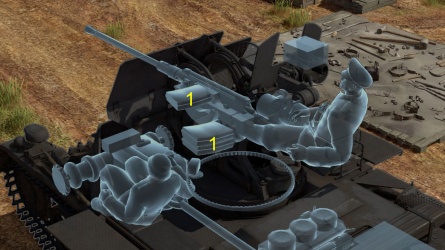
| Full ammo |
1st rack empty |
Visual discrepancy |
|---|---|---|
| 16 | 1 (+15) | Yes |
The way ammo racks work on the Flakpanzer I is very unusual. There are no ammo racks for individual cartridges of ammunition. Instead, there's a permanent ammo rack until the final cartridge is loaded into the gun, at which point all ammo racks disappear, including the one visible to be loaded into the gun, while there's still 20 bullets ready to be fired.
Usage in battles
The Flakpanzer I is an extremely versatile and potent vehicle, working largely as a glass cannon on the battlefield. It's best used as a flanker and tank-destroyer with situational use against unaware patrolling aircraft. The chassis is not particularly stable, making it more tricky to shoot on the move and easy to roll over. Turret traverse is very fast, allowing it to react to new threats and often fire the crippling shots before the enemy fully emerges from cover. While it can essentially spray 20 mm rounds at targets, it is advisable to maintain trigger control and conserve ammunition, firing only when needed because reload time between ammunition magazines is punishing, often being longer than hostile vehicles', giving them a better chance to take a second shot if the first one missed.
When shooting planes, avoid opening fire when the plane is far away from you. This will only waste your ammo and give your position away to both the plane and enemy tanks. Instead you have two tactics: one is to passively wait until the plane flies close and is unaware of you, then suddenly open fire. The other tactic is a bit risky. First, find good cover so you are not likely to get shot from tanks. Then regardless of the plane's distance from you, fire some random shells at it to get their attention. Once they know you're there, a lot of pilots will turn towards you and try to kill you, knowing that SPAAs usually have weak protection. When they're flying head-on towards you, use the fast fire rate and spray a stream of shells in their path and wait for them to crash into your shells, then quickly move away to dodge their bullets. Tip: aim slightly above the plane to compensate for the shell drop, as the distance between you and the plane is usually greater than you think.
While the gun is great, there are some enemies it encounters that you should straight-up avoid if at all possible. These are the Valentine Mk I, B1 bis, and B1 ter. If used in 1.7 lineups, the Matilda Mk II, T-28E, and M3 Lee/Grant are also significant threats. The Flakpanzer I can opportunistically destroy the B1 bis, T-28E, and M3 Lee variations in some situations, but the B1 ter, Valentine, and Matilda are totally immune even to the APCR belt outside of lucky hits in the turret ring.
The best tactic against hard targets is to use the Flakpanzer's adequate speed, get within 200 m of them and attack, with shooting at point-blank range being the most effective way. Before conducting an attack, check the Flakpanzer's and the enemy's surroundings to make sure no one will ambush the Flakpanzer. Once the tank is at the ideal distance, manoeuvre so that the gun is vertical to their armour. Do not shoot if the enemy is angling! The small calibre 20 mm gun is very likely to bounce off or not penetrate against sloped armour.
For the Matilda III, shoot at the middle of the near-vertical frontal plate to knock out the driver first, since the 20 mm shell is not enough to knock out the gunner after penetrating. Once it is immobile, go to its side and finish it by spraying shells at its hull sides, or shoot the right side of the gun mantlet to disable its gunner. For best chance of penetration, do not shoot its turret side.
For the B1, either aim for the near-vertical frontal armour plate at the right side of the hull, or the turret ring to incapacitate the commander/gunner, or simply move to its side and knock out the crews one by one by hitting its flat side armour. Remember to avoid its hull mounted 75 mm gun as it is very lethal to the Flakpanzer.
Pros and cons
Pros:
- Great firepower: wonderful combination of rapid rate of fire, adequate velocity, 20 round mag and various belt types- Sprgr. belt is destructive against low tier aircraft, while PzGr 40 is very deadly against armoured targets (e.g. M3A3, T-60 or even the B1 bis)
- Fast turret traverse allows it to keep up with close/fast targets easily, while the great gun elevation and depression means it can fight in any terrain
- Small profile allows it to hide behind cover or bushes easily, which mitigates for its lack of protection
- Thin turret armour can make some shells over-penetrate, dealing little damage
- Responsive handling
Cons:
- Extremely poor survivability: only two crew protected by hull-breakable thin armour makes it easily to get destroyed- common threats include artillery strike, nearby bombs, strafing planes, MGs (e.g. M13, GAZ-AAA) and HEAT (e.g. M8, Chi-Ha)
- Top speed of only 30 km/h makes it the slowest among counterparts and limits its ability to get to certain spots
- Slow reverse speed of only 5 km/h can get the player killed due to not being able to retreat from danger quickly
History
| Archive of the in-game description | |
|---|---|
|
In early 1940, the ordnance logistics department directed the Alkett and Daimler-Benz companies to develop a weapon mount with a circular field of fire, to be mounted on the chassis of the Pz.Kpfw. I Ausf. A tank. The outdated chassis was used since the Germans were intensely seeking alternative ways to use chassis. The Flakpanzer I had a hull, engine, transmission, and chassis which were similar to the Pz.Kpfw. I Ausf. A tank. In the modified turret box, in the place of the dismantled old turret, a 20 mm Flak 38 gun was installed on a platform. The gun had an operational fire rate of 220 rounds per minute and allowed the tank to effectively engage low-flying targets. This gun's vertical angle could range from -10 to 87 degrees. A total of 24 of these self-propelled anti-aircraft guns were built. Two more were built with 2 cm FlaK 30 guns. All of the Flakpanzer I guns which were released were used by the 614th flak battalion, which fought on the Eastern Front at Stalingrad. The guns were often used for direct fire support for ground troops, firing against ground targets. One of their flaws was that the trajectory calculation was cumbersome. In order to compensate for this, folding metal sides were added, but they did not do much to remedy the situation. Therefore, attacking ground targets required 5 people, but anti-aircraft fire required a crew of 8. The anti-aircraft vehicle was protected by nothing but its front armour. Most of the ammunition was placed in a specially designed Sd.Ah.51 trailer. Communication between vehicles was carried out using signal flags, since the radio equipment had been dismantled. The vehicle's biggest advantage was that the 20 mm anti-aircraft guns could be dismantled and installed on a platform towed behind the vehicle. These dismantling and installation procedures took 4 and 6 minutes, respectively. | |
Media
- Skins
- Videos
See also
- Vehicles of comparable role, configuration and era
External links
| Germany anti-aircraft vehicles | |
|---|---|
| Wheeled | Sd.Kfz.222 |
| Half-track | Sd.Kfz.251/21 · Sd.Kfz. 6/2 |
| Flakpanzer IV | Wirbelwind · Ostwind · Ostwind II · Kugelblitz · Zerstörer 45 |
| Other Flakpanzers | Flakpanzer I · Flakpanzer 38 · Flakpanzer 341 |
| Wiesel AWC | Wiesel 1A4 · Ozelot |
| Radar SPAAG | Gepard · Gepard 1A2 |
| Missile SPAA | FlaRakPz 1 · FlaRakRad |


